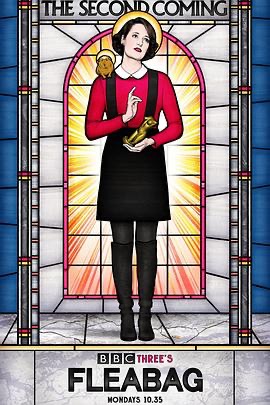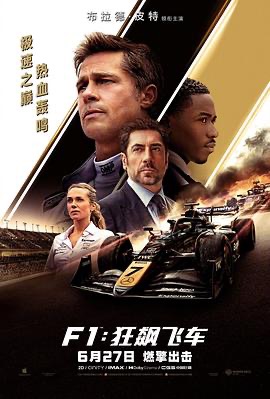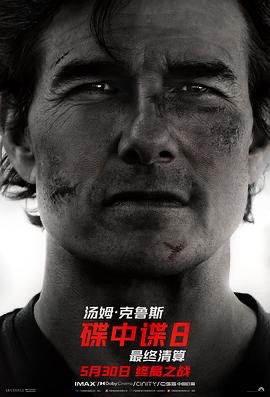Today’s Must-See Trailers
View AllWhat Everyone’s Watching — Stay Ahead of the Buzz

Lilo & Stitch
Maya Kealoha, Chris Sanders, Sidney Agudong
The extraterrestrial "experiment 626," Stitch (voiced by Chris Sanders), accidentally lands on a Hawaiian island during a space chase and meets a young girl named Lilo (played by Maya Kealoha). In order to escape capture, Stitch disguises himself as a dog and enters Lilo’s life, leading to a highly amusing yet heartwarming story.
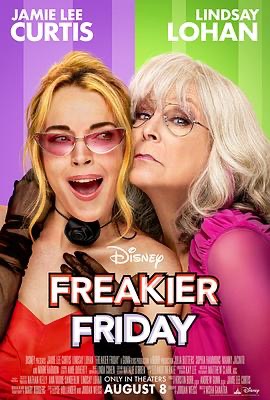
Freakier Friday
Jamie Lee Curtis, Lindsay Lohan, Julia Bates
Years later, after Tess and Anna go through an identity crisis, Anna now has a daughter and a future stepdaughter. In the challenges that arise when the two families merge, Tess and Anna discover that lightning may strike again.

The Naked Gun
Liam Neeson, Pamela Anderson, Paul Walter Hauser
The son of the renowned detective Frank, young Frank (played by Liam Neeson), is about to embark on the most absurd "rescue" mission ever.
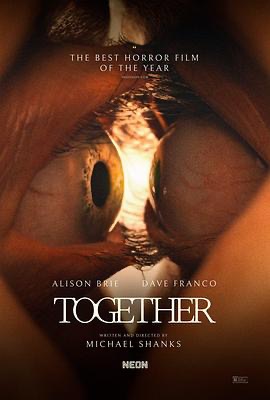
Together
Alison Brie, Dave Franco, Sunny S. Walia
Moving to the countryside has already tested the limits of the couple's relationship, and a special encounter begins their extreme transformation in love, life, and physicality.

Happy Gilmore 2
Adam Sandler, Ben Stiller, Julie Bowen
The sequel will tell the story of how he transforms from a discarded player into a golfer, as he competes in a prestigious golf tour.
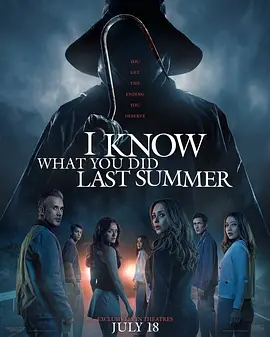
I Know What You Did Last Summer
Madeline Klein, Chase Sue Wonders, Jonah Hauer -King, Freddie Prinze Jr., Jennifer Love Hewitt, More...
If retribution has not yet come, it will eventually come. Five friends caused a serious car accident due to negligence, and they decided to destroy the bodies and cover up the truth. A year later, a mysterious killer who knew about the incident was waiting in the dark to take their lives. They found that a similar incident had happened several years ago, so they decided to ask for help from the two survivors (Jennifer Love Hewitt and Freddie Prinze Jr.).
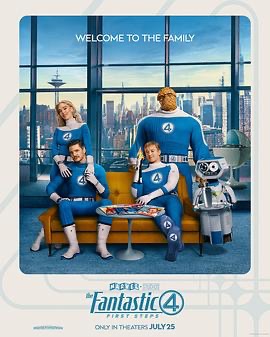
The Fantastic Four: First Steps
Pedro Pascal, Vanessa Kirby, Joseph Quinn
The story is set in a retro-futuristic world inspired by the 1960s. Marvel's First Family—Mr. Fantastic (Pedro Pascal), Invisible Woman (Vanessa Kirby), Human Torch (Joseph Quinn), and The Thing (Ebon Moss-Bachrach)—face their most daunting challenge yet. They must balance their roles as heroes and their family dynamics while defending the Earth from a cosmic deity known as the Planet Eater (Ralph Ineson) and his mysterious envoy, the Silver Surfer (Julia Garner). As the Planet Eater plans to consume the entire planet and everyone on it, no one can escape unscathed.
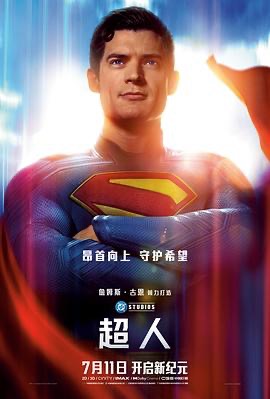
Superman
David Corenswet, Rachel Brosnahan, Nicholas Hoult
Director James Gunn brings a never-before-seen Superman story this time: focusing on the hero's growing pains, showcasing Superman's difficult choice between power and responsibility.
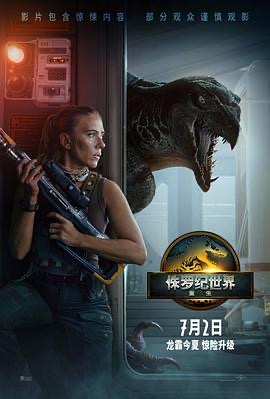
Jurassic World: Rebirth
Scarlett Johansson, Mahershala Ali, Jonathan Bailey
The story takes place five years after the events of *Jurassic World: Dominion*. The endangered dinosaur species are struggling for survival on a remote island, but hidden within them is a key gene that could bring medical miracles for humanity. To obtain this mysterious gene, an elite team infiltrates the forbidden dinosaur territory. However, what awaits them are unforeseen dangers and a shocking conspiracy.
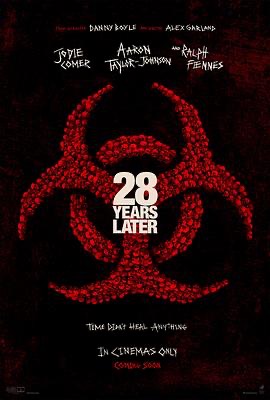
28 Years Later
Jodie Comer, Aaron Taylor-Johnson, Ralph Fiennes
The survivors of a viral catastrophe have established new settlements far from the city, but their peaceful lives are once again disrupted 28 years later. A more deadly mutated virus, along with increasingly twisted human nature and desires, raises the question of what will become of humanity's fate. This film is the sequel to *28 Days Later*.
Crowd Picks
View AllThe Films Getting All the Love and Loudest Praise
Fans Speak Up
View AllCandid Movie Takes — Straight from the Audience
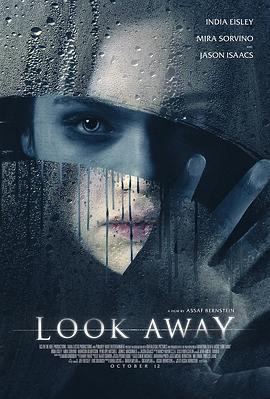
Look away
I believe everyone, like me at the beginning, felt confused when watching this film. How could such a beautiful girl be bullied by her classmates? Jealousy from her "bitchy" best friend is understandable, but why did the male students pick on her? The film emphasizes through nude scenes that these kids are 18-year-olds in the throes of hormonal surges. Boys, is your eyesight that bad? This confusion persisted until I learned about her father's occupation— a plastic surgeon. The root of all evil and symbol of wickedness in this film is the father. If the father's excessively strict demands on his daughter don't ring any bells, then the scene where he measures her face with a caliper, indicating where to shave a few inches or reduce a few points, almost explicitly reveals the truth. The heroine has undergone plastic surgery. Remember when the daughter met her father's mistress at the plastic surgery clinic? The father said, "I made an appointment with my daughter." Many viewers were misled into thinking the appointment referred to watching a movie later. In reality, they had scheduled a consultation for plastic surgery, but due to unexpected circumstances, they had to switch to watching a movie. That's why when the father and daughter return to the clinic later, there's a scene where he says, "This is your birthday gift" and insists, "Say yes." This is clearly not the first time. The heroine might have originally been an ordinary-looking girl, and her current beauty is the result of multiple surgeries. Since the twin sisters were born with deformities, she probably had minor flaws too. Thus, the perfection-obsessed father used this as an excuse to "correct" his daughter's "defects" repeatedly. In the eyes of her classmates, she became a freak who kept getting plastic surgery. Once this puzzle is solved, the film's theme becomes clear. This is essentially an extreme story of "pushing a daughter to greatness." As the heroine confronts her father: "Would you love me if I weren't beautiful?" The father is a fascinating character. In the second half of the film, there's a reference to the Circle of Cain in Dante's *Divine Comedy*—the circle for "betrayers of kin." Cain is the murderer in the Bible's first homicide, who killed his brother. This allusion hints at three things: First, the father's actions: he abandoned/murdered one deformed daughter and treated the other as his personal work of art. He cheated with his patients, betraying his marriage and the mother. He isn't a good person by social morals, yet he demands physical and mental perfection from his daughter. When he sees his daughter eating sloppily, he's furious; when faced with her nudity, he snaps, "Do you think this shocks me? Isn't this what I see all day?" This isn't just the director gratuitously showing skin. Nude women in the plastic surgery room are ordinary to the father as a doctor. He doesn't feel emotion toward the bodies he's about to cut open—he only looks for where to make incisions, which is exactly how he views his daughter. The Circle of Cain mentioned earlier is located in the ninth circle of hell—Cocytus, the Ice Lake. As the teacher in the film says, "People here lack love and human warmth." As he speaks, the camera cuts to the heroine. Second: those starved of love do crazy things. After killing her boyfriend, who might no longer love her, the heroine clings to a sliver of hope to seek her father's love. Yes, driven by compensatory psychology, what she desires most is her father's love. Of course, I believe she knows it's unlikely. The allusion to Cain also hints at her third act—patricide. After eliminating the father who forced her to be beautiful, she sees ugliness in the glass reflection. Maria stops responding to Elain. The kind,懦弱 side of the heroine disappears, or perhaps the two finally merge: the imperfect Maria vanishes, and the powerful Elain is no longer perfect. I've seen people debate whether Elain is schizophrenic or haunted, and whether it's Elain or Maria who disappears. The film doesn't intend to give a clear answer because it's unnecessary and irrelevant. What matters is that Maria/Elain stumbles home and curls up once again in the arms of her mother, the only one who loved her unconditionally.
Read Full Review
Homeless to Harvard: The Liz Murray Story
This movie *The Poverty-Stricken Harvard Girl*, also known as *The Road to Harvard*, is based on a true story, and I finally got to watch it after a long search. I also read the original book before watching the movie today. It’s a powerful film, adapted from real events. Liz's parents were both addicts, and her mother suffered from schizophrenia, became blind, and later died of AIDS. Liz's life was filled with hardship: she stayed in shelters, slept in subway stations, and rummaged through trash. Never having a proper home, her teenage years were mostly spent wandering in chaos. Occasionally, she had to play the role of the adult, going back to care for her parents and sister. She often sat crying beside her mother's sickbed. The people around her were mostly those who had faced unfortunate lives, dealing with peer violence, sexual abuse, and mental health issues. Day after day, she lived in a world devoid of hope and dreams. When her mother passed away, Liz went to the rooftop of a building and cried helplessly in the rain. At her mother's burial, there was no pastor, no ceremony. After the few attendees left, Liz quietly lay on her mother's coffin and softly spoke of the past. Despite all this, Liz managed to work her way to Harvard University through sheer will and determination. To pay for Harvard's expensive tuition, she searched for all available scholarship opportunities. On the day of the interview, she didn’t have a decent outfit to wear, only a ragged dress and a borrowed coat from her sister. Yet, she received the scholarship and entered Harvard. During her speech upon receiving the scholarship, Liz said that her life was forever changed at that moment. Liz Murray, the poorest and bravest Harvard girl, stood in the golden autumn of Harvard with determination in her eyes. Liz was born in 1980, and the film was made in 2003. Later, Liz realized that Harvard was not the right fit for her, so she transferred to Columbia University. This achievement wasn’t just due to Liz's efforts; her teacher, David, played an important role in her success. One example is from a scene in which Liz was unsatisfied with receiving an A- on an assignment and went to ask David for help, demonstrating David’s insightful guidance and support. **David:** Hey, new student. **Liz:** (complaining) You approved my admission but don’t remember my name. **David:** I remember your name; I just want the others to stand beside you. **Liz:** You’re smart. **David:** You are too. **Liz:** (gathering courage) You gave me an A-. **David:** Yes, I thought it was good. **Liz:** How can I get an A? **David:** Liz, an A- is already a very high score. After all, this is your first assignment. **Liz:** (pauses) If I write something useful, would you help me revise it? (hands the paper to David) **David:** (smiling) Alright... In this moment, Liz's behavior is also worth learning from. It’s interesting to observe what this unfortunate girl—homeless, with a drug-addicted mother who died of AIDS and a father in a shelter—did to manage, with just two or three years of schooling, to enter the prestigious Harvard University. Perhaps it was persistence in doing the little things, keeping a dream, and maintaining faith. There are many touching moments in the film. For example, a class discussion that I found quite engaging: **Classroom Background:** The students complain about losing loose-leaf pages and question why textbooks aren't used instead. **David:** Hmm, textbooks. Why don't we use textbooks? Who knows? **Girl A:** They're too heavy. **David:** (dismissively) Uh-uh... yes, but that’s not why you can’t have the cigars (reward for good class participation). **Girl B:** They’re too expensive, the school can’t afford them. **David:** (dismissively) Uh-uh... I’ll keep my cigars today. (points to Liz) You, new student. **Girl C:** (defending Liz) Her name is Liz. **Boy D:** (adding) Oh my God, David, she’s been here a week, and you still can’t remember her name? **David:** (playfully) Liz, sue me if you like. (He throws Liz a thick textbook and she flips it open) **Liz:** Textbook, textbook... (flips through, what does it say?) **Liz:** Words. (Everyone laughs) **David:** (guiding) What kind of words? **Liz:** (just got to the preface) The author's words. (Everyone laughs again) **David:** No, no, this is important. What’s in my hand? (points to the loose-leaf pages) **Liz:** (starts to realize) Other people’s words. **David:** Why am I giving these to you? **Liz:** (understanding) Because one perspective gives you one view. (closes the textbook and pushes it forward) **David:** (pleased but not showing it, throws Liz a cigar) Cigar, cigar, “commercial trademark” (referring to the earlier classroom discussion), sold to me by the guy who sells bubble gum, cigars! Why can we only see one person’s story? (walks around the class, looks at everyone, and points to the textbook, slowing his speech to emphasize) **Boy B:** (questioning) But isn't that the official history? **David:** No, (to Liz) Kid, tell him what history is. **Liz:** History is... (pauses) All of us. All of us count. **David:** (nodding at Liz) The bell rings for the end of class. We are all ordinary people, but we can make our lives extraordinary. Many people love motivational movies because they see themselves in the stories of others, but often the results aren’t as brilliant. However, everyone can be as remarkable as Liz. She rarely went to class, less than three times a month, but like in that scene, she didn’t let the teacher take away her test papers and still insisted on doing the English assignment, saying, “No, I want to do it; it doesn’t seem that difficult.” We all need to pursue something, and these pursuits are not as difficult as we think. The hardest part is convincing ourselves that they are not hard and taking the first step. Many successful people summarize their past by saying, “I’m not a genius...” That's right, we are all ordinary people. “I just kept going…” Yes, even small things add up. “Einstein had to put in a lot of effort,” Yes, no one becomes successful by accident, but we can certainly make our lives extraordinary. Liz aced that test, and the teacher asked her how she did it. **Liz:** “I read a lot of books.” **Teacher:** “What kind of books?” **Liz:** “Encyclopedias. The lady upstairs, Ms. Iva, found some books, but there was no R-S section. If you asked me about that part, I wouldn’t have any answers. I just got lucky.” Yes, many people who are lucky might have seen the same book Liz referred to, but still wouldn’t be able to answer the question correctly. If you meet successful people, talk to them, or watch their interviews, you’ll find that they often take their success for granted. And it makes sense—success is the result of persistence in doing things that others are unwilling to do, the little things that may seem insignificant but, when accumulated, lead to greatness. As the ancient saying goes, *"The beginning is always the hardest."* And *"A good start is half the battle."* If you persist in something three times, by the third time, you will succeed. This is true.
Read Full Review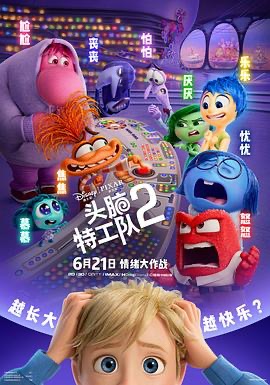
Inside Out 2
My "Jittery" Should Rarely Rotate Shifts with Its Companions. I first realized that my body couldn't fully relax during a consultation with a therapist. At the time, I was experiencing neck problems, and my left arm hurt so much that I couldn't lift it. The therapist squeezed my neck and said, "Your neck is so tight." Only after she said that did I truly realize that my neck was in an abnormal state of tension. This anxious, tense state had been with me for so long that I had assumed that this was just how my neck should feel. The therapist kept saying, "Your shoulders and neck are so tense, you need to relax." The more she encouraged me to relax, the more anxious I became, and my body became even tenser. My neck and shoulders lost control of my brain, and my mind began to wander. I thought about something my mother often told me: "Straighten your back." Whenever she said that, she would stretch out her hands to straighten my hunched shoulders and realign my forward-tilted neck. If I relaxed my neck and shoulders, I would slouch; but if I slouched, it would worsen my posture and neck problems in the long run. In that moment, my neck and shoulders were in an awkward position: shrinking forward meant a life of relaxation and degradation, while pulling back meant a healthy and graceful future. I really wanted to tell the therapist: "My neck and shoulders have never relaxed in my life. What does it feel like to relax? I don't know." **Inside Out 2** continues the story from the first movie, mainly focusing on the protagonist Riley, who, after learning how to handle various emotions, faces the onset of puberty. Her emotions become more complex, more intense, and often uncontrollable. Her self-confidence plummets from its highest point to the lowest. On one hand, she is still a child who loves watching preschool cartoons; on the other hand, she admires the older girls with dyed hair and tries to make herself look just as cool. Anxiety and inferiority occupy her entire life, as she worries about not being good enough to gain her teacher's recognition, not being cool enough to fit into the clique, and feeling incapable of even enjoying her hobbies. Who hasn’t gone through this phase of puberty? When I saw Riley get her first pimple, it reminded me of my own adolescence: pimples covering my face like a sea of flowers, and my friend used to say that if she went blind, she could identify me by feeling the bumpy texture of my forehead, just like a Snickers bar. My neck and shoulders first gave way during puberty, too. As one of the few girls in the class who developed early, I dressed like Madonna wearing a pointed cone bra at a concert. I felt strange and was afraid of being ridiculed. To hide those awkward cones, I started unconsciously hunching my back. My neck, which had once leaned forward, was never the same again—just like Riley, my "Jittery," "Awkward," "Disgusted," and "Longing" have been with me since puberty. I guess their control panels were designed on a viewing platform, just like my forward-tilted neck. From that platform, I can see the long river of awkward puberty memories floating below. The design of Jittery is brilliant. From the outside, it already looks like it's anxious to the point of madness, but it always wants to do good. As a minor antagonist in the movie, it’s hard to dislike. Because the forward-tilting neck impacts both image and work efficiency, I joined a gym to work on my back. Once my back was stronger, my neck stopped hurting, and I had more energy at work. But the more I worked, the more my neck tilted forward. This endless cycle continues. Anxiety has woven an invisible scarf around my neck, showcasing its "choking" techniques. As a movie character, Riley is far luckier than real people. The movie uses a hockey game to help Riley find herself, while my self didn’t return to the control room until puberty ended, hormone levels stabilized, and I went through more life experiences. The multiple selves presented in the movie are more like compromises with my personality, giving up resistance to fate—this is just who I am, and I’ll let it be. In the movie's final scene, the nine emotions finally compromise and share the control room. After puberty, Riley's emotional changes become more subtle and complex, signaling that as we grow up and become more self-aware, we also become more skilled at handling past emotions. Unfortunately, the final part of the movie, where Riley's secrets locked away in her mind's "secret prison" never return, was a missed opportunity. When a person faces their true self, one significant feature is that they become more willing to accept their past shame. Perhaps Pouchy is modeled after someone on the creative team who loved watching "Dora the Explorer" as a child, or when we see Lance, we’re reminded of the long-haired characters in "Final Fantasy." The retro animation and game design of these two references made the whole theater laugh, setting the tone for the movie's audience: like "Inside Out 1," it's not just a children's movie but one made for adults who have faced themselves and experienced—or are currently experiencing—anxiety. This article should’ve been called **"A Life Dominated by My Neck"**. Months ago, during a night of neck pain, I had already typed that title. Tonight, sitting in the theater with muscle-relaxing patches on my neck, pretending it feels fine, when I saw Jittery trying to control everything but losing control at the control panel, tears couldn't stop flowing. I think the orange little figure at my control panel must be very tired. How’s your neck doing? I wish your neck wouldn't have to carry so many burdens anymore. Unfortunately, for most of us, our puberty was tougher than Riley's, and we unknowingly became hosts of anxiety. While American kids are worrying about fitting in with the cool girls, we’ve been worrying since first grade about whether we can get into a 985 or 211 university. This anxiety is refreshed every week with tests, and before "Disgust" can even touch the touchpad, "Jittery" takes control again. Anxiety makes us lean over our desks day and night, writing test papers, our necks always tilted forward toward an uncertain future. As we grow older, the desk turns into an office desk, the homework becomes a computer screen, but the neck still leans forward as we stare at the screen. Many people in foreign countries like to teach people how to distinguish Asians, but they don’t need to focus on makeup, clothing, or height; those with the most forward-tilting necks are usually us. This movie is very realistic: When you're anxious, it feels like your emotions can’t appear, and even crying feels like a mistake. When anxiety takes over, we can only reflexively hide our feelings, but "Disgust" just wants to cry when it touches the control panel, and yet it gets stolen by anxiety. The more anxious we are, the busier we get, sometimes completely lying on the sofa, giving up, but both emotions are fighting in our brain. Do you remember Hu Shi’s diary? On July 4th, he was still anxious, encouraging himself to work hard and read Shakespeare's works. After playing cards for three days, anxiety took over again, and in his diary, he scolded himself for being lazy. He went back to playing cards the next day. This type of playing doesn’t even bring real joy, just like how our desks are filled with empty summer homework during the holidays, each day spent with anxiety. This is me: sometimes anxious, sometimes disgusted. When I’m anxious, I quickly study for a while, and then I lie down again. It's like doing sit-ups with a Motorola flip phone. When we are anxious for too long, we forget that as children, we once had pure joy. In the movie, "Joy" says, "I understand now, growing up means no longer needing joy." On one hand, the threshold for happiness increases—joy seems to have become harder to satisfy ever since I started pretending to be a cool teenager in puberty, pretending to leave behind my childhood happiness and join the adult world, drinking coffee and tasting life's bitterness. Over time, I even forget what real joy feels like. On the other hand, pure joy has become too extravagant, and enjoying it feels guilty. Anxiety and happiness follow each other, with the joy of food reminding us of the anxiety of dieting, the joy of vacations followed by the anxiety of returning to work, and the joy of love mixed with the anxiety of reality. In the movie, Jittery has a screen that projects possible future disasters, and anxiety arises from imagining too many negative things, which makes it worse. People often say we should focus on the present and not worry about what hasn’t happened yet, but it's because of anxiety that we have the motivation to work hard and change our lives.
Read Full Review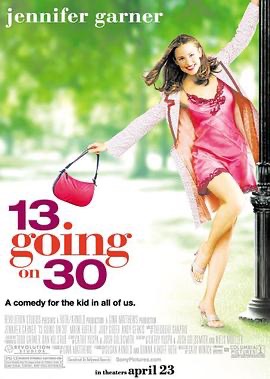
13 Going on 30
2008.12.14 Sunday SunnyWho can give me a bag of wish powder Tell me what I should cherish and what I should let go Finally finished watching 13 Going on 30. I really envy Jenna. A person’s present always leads to that particular future self. No one knows if the persistence at that time was right or wrong. Sometimes, the very thing you dream of could be the source and beginning of your mistakes. That bag of wish powder gave a 13-year-old girl the body and life of a 30-year-old. But in reality, it just gave her the opportunity to break free from herself and her original life path. The 30-year-old life felt like a dream within a closet—vivid and awakening. After waking up, no one would care about the schemes and wars surrounding Poise magazine and Sparkle magazine anymore. The story is exciting and convincing. But does this mean that a 13-year-old child’s mentality is better able to handle life and its challenges than that of a mature adult? This question is worth pondering and reflecting on. Today I’m 13, tomorrow I’m 30. No matter what, I believe that after such a magical time-travel journey, anyone would experience that moment of realization. And I still hope— Who can give me a bag of wish powder And tell me what to cherish and what to let go.
Read Full Review
Heinähattu ja Vilttitossu
Bored out of my mind, I spent the entire day watching movies. The only one that left an impression was *Siff and Siso*, shown on CCTV1’s Sunday cinema. After searching everywhere, the only place I found a review was in the *Maoming Daily*. There was no gripping plot, no dazzling beauties, but I saw gardens lush with green grass, window sills overflowing with flowers. I saw women in bright clothes with two funny little buns in their hair, with larger frames, yet living comfortably. I saw two girls, one sensible, one lively, both impossible not to love. I saw mothers and daughters playing on the balcony, seemingly returning to childhood, and I began to hope for a daughter someday. I saw a policeman acting as a referee, just to make the child who won the championship happy. I saw colorful dough in the garden, and wished that when life feels unhappy, I could sit in a tub of dough like that. I don’t know if this is the true life in Finland, but there’s no doubt that I’ve come to love this country and long for this way of life.
Read Full Review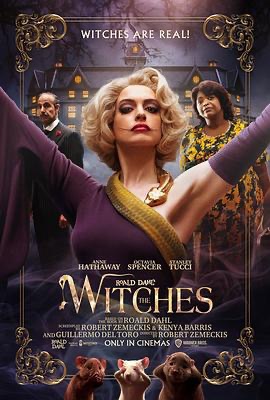
The Witches
In December 1968, in Chicago, 8-year-old African American boy Gatsby loses his parents in a car accident and moves to live with his grandmother in Demopolis, Alabama. His grandmother buys him a pet white mouse, which he names Daisy. One day, at a grocery store, they meet a Black witch who offers Gatsby candy. His grandmother tells him the story of her childhood friend, Alice Brew, who became a chicken after accepting candy from the witch. The witches are notorious for hating naughty children; they are bald, with mouths extending to their ears, and their fingers and toes have three digits. Gatsby’s grandmother is a Vodou priestess. For safety, Gatsby’s grandmother takes him to New Orleans and has his cousin, Easton, book a room at the Royal Island Hotel, where Easton works as the executive chef. Unfortunately, the witches, disguised as the Child Abuse Prevention Society, are holding a meeting at this hotel. Gatsby sneaks into the attic to spy on the gathering, where the elder witches plan to eradicate all children. A fat boy, Bruno, accidentally stumbles into the meeting and is transformed into a mouse by the witches' magic. Daisy bravely saves Bruno, but Gatsby is caught by the witches and also turned into a mouse. Daisy's real name is Mary. The three mice mix the witches’ purple potion into the soup, causing all the witches to turn into mice as well. They then steal all of the witches' potions and money.
Read Full Review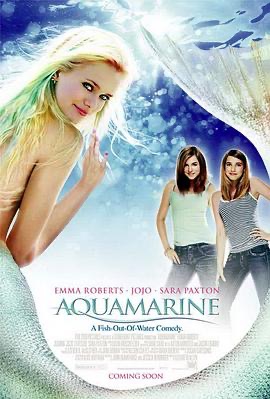
Aquamarine
This is such a cute movie that makes you smile uncontrollably, like the feeling of looking up from the bottom of the sea to see the sunlight sparkling on the waves. There's no depth, no sadness, and no burden—it's simply a fairy tale where the princess and the prince know each other's hearts, and the best friends hold hands and embrace, their friendship as solid as can be. The main characters are pretty ordinary: one is chubby with a round face, the other is small and unremarkable. The little girl's emotions are clear on her face, and when faced with parting, she encounters a real mermaid. In order to make her wish come true, she sets aside her own dreams to help the mermaid win over the handsome lifeguard. There's tracking, competition to worry about, and the constant concern of the mermaid's tail being exposed. This summer is full of thrills. After all, they want to continue living together, and they even see a storm as a good thing, putting aside their pink fantasies for a moment. One wish is all they need. Two little girls and a mermaid, three days of time, each with their own goals—it’s hard to believe they could form such deep bonds. Even the practical questions of how to truly recognize love and whether the man, who was showing off his muscles to other women just days ago, can truly be trusted with their hearts, remain unanswered. But, since it’s playful, lighthearted, and simply a warm story, we accept it without question. In the end, the wish remains just that—a wish, like an unopened magic box, more precious than any gift. In the end, the three are still together, but they move in different directions, leaving behind the memory of a summer's end. Let’s indulge in the sweetness for a while, watching the fireworks light up their faces, seeing them dance together with her gracefully walking into his arms, watching him nervously joke about her tail, the phosphorescent glow shining beautifully. Watching them tumble and laugh together, not knowing whose arm or whose leg belongs to whom, seeing them bicker like children and make up just as quickly, feeling the warmth of a kiss, but knowing it’s the embrace that truly matters. Summer is indeed the season for us to be together.
Read Full Review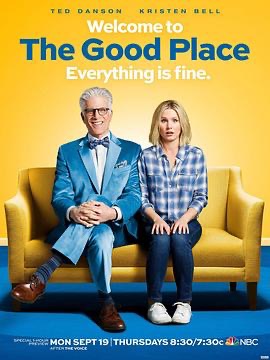
The Good Place Season 1
I never thought that a sitcom could seamlessly incorporate philosophical theories while making us laugh. A fictional afterlife "Good Place" certainly serves as a perfect setting to practice philosophical ideas. 1. **Categorical Imperative** When Chidi discovers that Eleanor does not belong to the Good Place and contemplates whether to lie to help her, he asks himself: Should he help Eleanor according to the moral principles of the Categorical Imperative? This question perfectly triggers Chidi's decision-making paralysis and causes him stomach pain... Immanuel Kant introduced the concept of "Categorical Imperative," which requires a person to act consistently according to immutable moral principles, no matter how external circumstances change. According to Kant’s theory, lying, stealing, or any other immoral act has no excuse. Even a white lie, done with good intentions, is still immoral. Since Eleanor does not belong to the Good Place, if Chidi helps her, it would involve deception and cheating, which would be considered immoral according to Kant. However, on the other hand, Eleanor asks Chidi to help her become a better person. Refusing to help someone improve is another form of immorality. Chidi feels that whatever choice he makes is immoral, leading to a moral dilemma that gives him stomach pain. Another example of the "Categorical Imperative" is when Chidi gives insincere praise to his friend’s hideously ugly shoes. Even if it is out of kindness, it’s still lying, which violates the Categorical Imperative. Thus, Chidi cannot sleep over this small white lie and feels compelled to tell his friend the truth once the surgery is done. So, what kind of answer would satisfy Kant? A misleading answer would be acceptable, such as: "I have never seen shoes like this (beautiful/ugly)!" In Kant’s view, a misleading answer is not immoral because, when lying is an option, a misleading statement is itself a form of respect for moral commands. ### 2. **Utilitarianism** Compared to Kant’s Categorical Imperative, Utilitarianism is undoubtedly a philosophy that is easier for most people (including Eleanor) to understand: one should choose the actions that achieve the "greatest good" for the greatest number, even if it means sacrificing the interests of a few. Utilitarianism sounds flawless until faced with dilemmas like the "trolley problem." It is said that later seasons of *The Good Place* perfectly reproduce the trolley problem, but in the first season, there is already a Utilitarian dilemma: Chidi struggles with whether to help Eleanor because, on one hand, helping her become a better person and stay in the Good Place would maximize overall happiness. However, if Eleanor stays, it means Chidi’s true soulmate will never appear, which sacrifices his personal happiness. Once again, Chidi is at a loss, guided by philosophical theories. ### 3. **The Moral Value of Motivation** In the second half of the first season, the four-person team hopes to raise Eleanor’s score to keep her in the Good Place, so Eleanor performs many "good deeds," such as holding doors for others, organizing apology parties, and giving gifts. However, none of these actions affect her score. This brings us back to Kant (who probably contributed over half of *The Good Place*’s philosophical theories). Kant believes that "the moral value of an action lies in its motivation." If the motivation is to satisfy personal interests, then the action cannot be considered moral. Therefore, all of Eleanor’s good deeds, done with the selfish motive of staying in the Good Place, are not counted in the scoring system. A similar situation happens with Tehani: Even though she raised 600 billion dollars through her charity event, her impure motives mean she still does not belong to the "Good Place." So, when Eleanor’s motivation changes and she performs good deeds not for selfish reasons, those actions finally become "moral deeds" and are counted in the score. The big twist in the last episode of *The Good Place* is certainly interesting, but isn't it just as fascinating to see real-life acting of philosophical theories and moral dilemmas in a sitcom? It certainly brings a smile and makes you reflect.
Read Full Review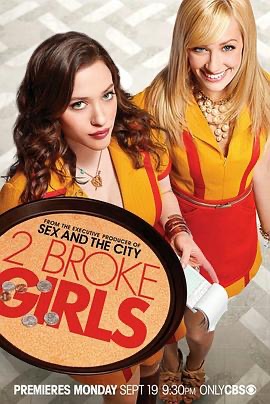
Broke Girls Season 1
I was part of the 2003 college entrance exam cohort, entering the exam hall during the peak of the SARS epidemic. I graduated in 2007, and I had the option to choose Beijing or stay in Chengdu. But in the end, I did what I consider a failure and returned home, settling down in a small fourth-tier city. Now it’s 2011, and the age when I had ambitious dreams feels farther and farther away. I have too many regrets, too much cynicism, and an energy that, after all these years, has slowly withered into nothingness in the monotony of life. I have a stable job, stable social connections, stable income, and stable routines. On the surface, everything seems great, but I often feel like I have nothing. As a child, I dreamed of having a sweet little dessert shop, flipping through novels in the scattered sunlight, pretending to be artsy and sophisticated. And now, this is the only dream I have left—about freedom and peace. I really need a dream. A long time ago, I calculated the cost of opening a dessert shop—rent, utilities, taxes, and all the expenses I would need to cover by selling a certain number of cups of coffee every day. How much startup capital could I gather? How much would I need to borrow from the bank? Where would I source the ingredients? How would I market it, promote it, and eventually profit? All these questions swirled in my mind. But no matter how much I thought about it, it was always in the planning phase. Year after year, until time wore down my courage and edges. On the night when Caroline was drunk, she told Max, "I have nothing now. I need that bakery so badly. I know you're scared of success, but I believe in your dreams. Please, let’s work together. We’ll succeed." Actually, we all crave a sweet dream when life is piercing us from every direction.
Read Full ReviewInstall Our App
Get quick access to reviews, save your favorites, and receive notifications about new reviews for the movies you love.
- Access reviews offline
- Get notified about new reviews
- Save your favorite movies
- No app store required
For iOS devices:
- Tap Share button
- Scroll and select "Add to Home Screen"
- Tap "Add" to confirm

Movie Help Desk
Find answers about using the site, watching trailers, and diving into our community-driven content.
How often do you update your trailers?
We refresh our “Hot Trailers” page daily with new previews and early looks at both big releases and hidden gems.
Is everything really free?
Yes — no subscriptions, no accounts needed. Just press play and explore.
Can I post a review myself?
Soon! We’re working on user submissions — until then, enjoy our growing library of viewer thoughts.
Why isn’t a trailer playing correctly?
Trailers may occasionally be restricted in some regions. Try again later or check other videos — we update fast.
How do I know a review has no spoilers?
We flag spoiler-free reviews for easy browsing. When there’s detailed analysis, we give you a heads-up first.

